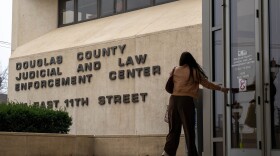-
A Kansas Senate committee is considering a bill to pressure Democratic Gov. Laura Kelly’s administration to comply with the federal government’s request for the data, including social security numbers. Kansas is one of more than 20 states rebuffing the request.
-
The Democratic Kansas governor and Republican attorney general don’t always agree about suing or joining existing lawsuits. Now the Kansas Supreme Court could decide.
-
Kansas Legislature's leaders and elected state officers challenge Gov. Laura Kelly's perspective. The governor claims constitutional authority to "stand up for Kansans." The Kansas Supreme Court will hear oral arguments on Jan. 16.
-
The report uses Kansas and Arizona to illustrate the unforeseen financial costs of executing documentary proof of citizenship laws as they gain traction in Congress and statehouses nationwide.
-
Health care for some immigrants was stripped away more than three months ago when President Donald Trump rescinded a rule that offered health care plans to people who migrated to the U.S. as children.
-
A Kansas judge sided with Attorney General Kris Kobach that state law does not allow the quarter-cent public safety sales tax to be extended for the uses Johnson County commissioners wanted. The county will formally withdraw their resolution to put the question on the March ballot.
-
In his first interview since being accused of voting illegally by Kansas Attorney General Kris Kobach, Coldwater mayor Joe Ceballos, a self-described loyal Republican voter, contends he thought he could vote as a legal permanent resident. His friends and high school teacher worry they're partly to blame.
-
The families of two transgender teens are asking a state judge to temporarily block the ban on care. That would allow young Kansans to resume hormone therapies and other treatments.
-
Kris Kobach, the Republican attorney general, says that several Kansas Bureau of Investigation agents have been trained to make arrests in collaboration with federal immigration authorities. He talked about the state's recent law enforcement initiatives, plus his clashes over legal authority with Democratic Gov. Laura Kelly, in an interview with KCUR's Up To Date.
-
Kelly, a Democrat, said that she has repeatedly asked the Republican attorney general to sue on behalf of Kansas but he has refused. Meanwhile, Kris Kobach argues that he is in charge of the state's prosecution or defense.
-
The American Civil Liberties Union filed a federal lawsuit challenging a state law that allows judges to extend probation for years when an offender fails to pay restitution in their cases. The lawsuit alleges the practice punishes people for being poor.
-
Kansas GOP leaders have condemned offensive messages sent in a national Young Republicans group chat. They said the group is now inactive.
Play Live Radio
Next Up:
0:00
0:00
Available On Air Stations












